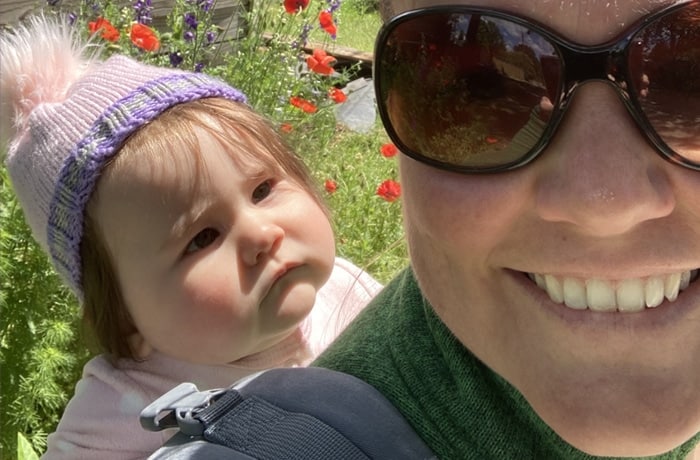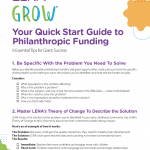Sensitive Content Warning
This blog post is about maternal mental health and discusses depression and anxiety. If you or someone you know needs help, please call Postpartum Support International at 1-800-944-4773 or visit https://www.postpartum.net/get-help/.
As I write this, my heart starts racing. Describing my mental health — and specifically my mental health postpartum — elicits feelings of fear and shame.
Despite this, I believe deeply that it is important to share my struggle with postpartum depression — to show that it does not have to be a source of shame and that it is part of many families’ experiences.
I also write this in hopes that it helps family engagement professionals, LENA Start coordinators, home visitors, and early childhood educators to understand these experiences and empathize with mothers suffering from perinatal mood or anxiety disorders (PMADs).
I have worked in the field of early childhood development for over 10 years. I know how important a healthy perinatal period is for a child’s life trajectory. I also know about all the risk factors that can arise, including maternal depression. Right after I gave birth to my first child, I gained a new, visceral understanding of the phrase “risk factor.” Six weeks postpartum, I found myself sobbing in the bathroom, hiding from my newborn, in the depths of a mental health crisis. I couldn’t sleep or eat and was hardly able to care for myself, let alone my baby.
And I was one of the lucky ones. I was lucky to be in a stable home environment with parental leave, access to resources, and a loving partner who could care for our child. I was doubly lucky my midwife gently but firmly recognized my suffering at a six-week appointment and immediately gave me the tools to get better, including medication, therapy, and referrals to support groups. Many women are not this lucky, and instead suffer in silence, or are shamed or minimized by their care providers. The same goes for men, who can also suffer from postpartum mood disorders.
As my mood began to stabilize with treatment, I was able to spend more time with my child and focus on the interactions we were having.
Thanks to my work at LENA, I knew the 14 Talking Tips by heart, but at the beginning it felt like climbing Mount Everest to enact them with any frequency. That it felt so difficult and “unnatural” led me to a spiraling sense of shame. In my head ran refrains of: “Why am I so bad at this? Why doesn’t my child respond to me? What’s wrong with me? I can’t do this.”
But some small part of me kept on trying whenever I could muster the energy. Even when my mind was still reeling with anxiety and depression, I took a “fake it till you make it” approach. While I still experience some ongoing depression, today I’m a proud mother of a 2.5-year-old and I feel present and energized when interacting with her.
Now that I have some distance from it, I’ve been reflecting on my early experience, especially as it relates to my daily work here at LENA. I often wonder: At what point in my journey through postpartum depression might I have benefitted from a parent program like LENA Start or LENA Home? When would it have helped most without being overwhelming?
These are complex questions in need of thoughtful answers. We can’t assume that now or as soon as possible is necessarily the right time for every parent to participate in a LENA program. Nor should we assume that parents couldn’t handle it. LENA Start would have helped me immensely. Ultimately, I believe LENA should offer its programs, amplify their benefits, and then trust each parent to know what might help them when.
A BOTH/AND approach that includes strengths-based coaching on interactions is likely to be helpful. It doesn’t make sense to withhold resources about early interactions from parents just because they are struggling with mental health. Small wins — enacting a talking tip when you feel able, for instance — can help build feelings of self-efficacy and promote bonding with your infant. That was my experience, and research backs it up.
When it comes to promoting interactive talk with infants, what can you do to ensure you are supporting parents with mood disorders appropriately?
- Use a strengths-based approach to coaching. Parents experiencing mood disorders are especially vulnerable to negative self-talk, which is counterproductive to adult-child interactions. If coaching in a group, ensure that facilitation and conversation remain strengths-based and that parents refrain from comparing themselves to one another.
- Check in regularly with parents to make sure coaching is relieving stress, not adding to it: “How are you feeling as you try to talk more? What happens in your brain and body? Is it feeling helpful to you?”
- Make space for parents to connect to one another and share their personal stories and struggles safely and without judgment.
[callout]



